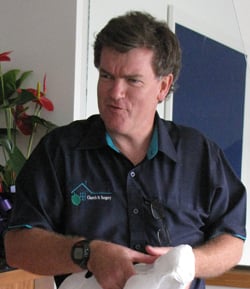Rural round-up: Dr Jo Scott-Jones


Dr Jo Scott- Jones (pictured) is a rural GP from Opotiki, in the North Island of New Zealand. He is the public relations person for the WONCA Working party on Rural Practice and this month the author of the his second WONCA Rural Round-up.'
“
He taru kahika” -
Walk on, it is only summer rain falling. (Maori Proverb about resilience.)
Rural communities in the 21st Century need to build resilience and as health providers we can be powerful contributors to that work.
They need resilience because they are facing the challenge of climate change.
They need resilience because they are facing economic pressure.
They need resilience because they are getting smaller.
They need resilience because they are politically marginalised.
They need resilience because no-one else is going to be there when push comes to shove.
The rural New Zealand primary system depends mainly on small businesses owned and operated by GPs - this competitive model of providing care is prone to inefficiency and reduces resilience as what is right for a business is often not what is right for a community. Competition between providers may result in “lean” businesses, but people’s needs are often sacrificed and long term planning and development takes second place to profit and short term gain.
As a profession we take responsibility for the whole person, we walk the talk when we adopt the bio-psychosocial model of care - we approach the individual and their family in a holistic way and address their physical, emotional, and spiritual needs to enhance their sense of wellness. Increasingly we need to do this for their communities as well - people need communities to live and work in, and an unhealthy community makes life worse for everyone.
It may seem too hard to begin to embrace the task of developing sustainable, well connected communities in which our patients can live - the good news is that it starts with ourselves as a community of rural providers.
Small towns and communities may have rosy reputations as “rural idylls” but those of us that live in them know the truth that many small communities are exclusive, self absorbed, toxic to change and intolerant of difference. Rivalries are not diluted by the sense of anonymity and distance that can be achieved in larger places, individual and generational grudges can develop and tend to be sustained.
Health workers are not immune to these failings, we can develop professional jealousies and arrogance that make us inaccessible to others, and cut us off from our fellow health team members.
However there are great examples of how we can do better. In preparation for the upcoming conference in Gramado (
http://www.woncarural2014.com.br/ingles/index.php) the wonca rural working party google group has been discussing the role of rural hospitals in communities and disaster preparedness. Visit Arran Resilience (
http://www.arranresilience.org.uk) to see how it can be done, if you have “the spark.” (
http://www.globalfamilydoctor.com/News/RuralRoundupItsallaboutthepeople.aspx)
It is also important that rural providers, despite being intensely busy day to day, become involved in national networks. We bring a unique perspective to these tables and without our involvement our communities will be less visible, by being involved we can help make the people who have power focus on the resilience of our communities.
We should be looking out for each other in our communities, especially at times of trial when we are under most stress - the WONCA community offers this for us internationally through conferences, through the chatrooms and website. If you are rural have a look at the Wonca Working Party for Rural Practice (http://www.globalfamilydoctor.com/groups/WorkingParties/RuralPractice.aspx ) and follow the
@ruralwonca twitter handle.
It doesn't have to be so hard. Ask yourself - how often do you sit down with the other health providers that work in your area and share a cup of tea? There is a wealth of expertise in your neighbours that can be learnt from and built on, and you have a shared experience of care and can support each other in your work. Make 2014 the year to take advantage of your networks, put aside past grievances, pull up your big boy / girl pants and get together for a chat.
Dr Jo Scott-Jones
Opotiki
New Zealand